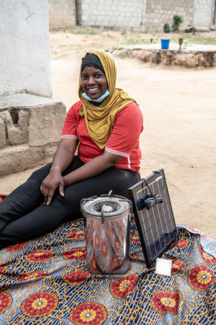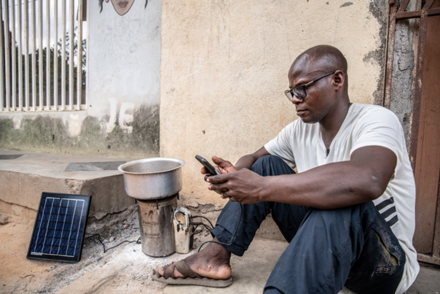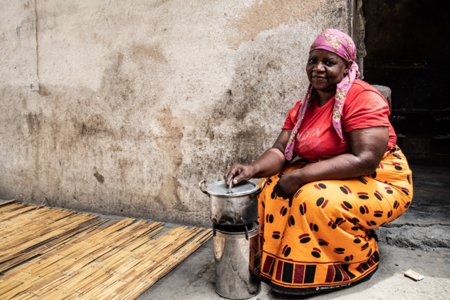Pt/Pamoja Mocambique LDA
Pamoja Mocambique LDA
Company Outline
Pamoja Mocambique LDA is a profit-making Mozambican social enterprise dedicated to the promotion and sales of ultra-clean gasification stoves, sustainable solar energy and biomass fuels.
Company Location: Av. 25 de Setembro, R/C _Nampula
Countries of Operation: Mozambique, Sweden and Uganda
Areas of operation: Nampula province
Company Size in Mozambique: 11-50 staffs
Pamoja conducted a Feasibility Study in 2017 in partnership with the cashew industry to assess the best use of cashew shells residues as a waste to energy product. From this Feasibility Study, Pamoja developed a business to convert waste from the cashew Industry into a productive cooking fuel for efficient gasifier stoves. The business generates additional incomes for the cashew companies and creates positive social and environmental impacts for the communities around Nampula.
The initial piloting activities of stoves and “Moro Wakoroxo” fuel distribution in 2017 – 2018 were co-financed by Grants from the Norwegian Embassy in Maputo and from the Norwegian Agency for Development Cooperation (NORAD).
The scale-up phase from 2019 was financed by Pamoja and co-financed by a Grant from the Energy and Environment Partnership (EEP) for the development and implementation of the CRM-system and PAYGO stove. Additional development of the digital infrastructure for the Smart Cookstove Concept is co-financed by a Grant from the Africa Enterprise Challenge Fund (AECF). Additionally, the BRIHLO programme provides a Result Based Financing (RBF) incentive to subsidize the costs of the stoves and will enable the scale-up to 7000 customers by 2024.
Solutions Offered
Pamoja Mocambique's advanced biomass cookstove business, based in Nampula, is built around the sales of “Moro Wakoroxo”, a cooking fuel locally made from available cashew shells. Pamoja’s Smart Cookstove concept involves the distribution of African Clean Energy's (ACE) hybrid energy system, the ACE Smart stove, that delivers a unique combination of thermal and electrical energy. The system consists of a Tier-4 forced-draft ventilated stove powered by a solar-powered battery that can provide lighting and phone-charging. ACE Smart stove connects with a smartphone App extracting unprecedented data from stove-users about their fuel consumption. From a customer point of view, our products offer access to clean cooking with a clean and sustainable cook fuel, access to basic electricity and access to ICT. This represents a substantial improvement in the life of many Mozambicans.
The cookstove, which has an efficiency of 42%, is sold as a single unit with the package including a 10W solar panel, a LED lamp and a wall charger. The cookstove consists of a LiFePO4 battery that powers the fan inside the unit during gasification. It has a slot for connecting the panel and light. It also has two USB ports for phone charging. The stove with the solar powered battery provides clean cooking access to its customers while also enabling basic electricity generation for lighting and phone charging.
The ACE Smart stove is manufactured at ACE's factory in Maseru, Lesotho. The stove package and its relevant components are then shipped to Pamoja’s warehouse in Nampula where the distribution begins. Pamoja manufactures its “Moro Wakoroxo” fuel locally and has integrated its own fuel distribution value chain.
Pamoja is currently developing a Carbon financing mechanism to roll-out its concept for more than 200,000 households in Mozambique.
Consumer Insights
Pamoja's target market is specifically focused on low-income households with regular or semi-regular income in peri-urban and urban areas of Nampula. In addition to unstable electricity access, most of these households are typically reliant on charcoal as a cooking fuel. These households typically spend around 1000 MZN per month on charcoal for cooking purposes. Furthermore, with the current global pandemic, there is an immense pressure on the supply of charcoal resulting in rising prices.
After the introduction of our products, our customers have monthly fuel expenditure of 360 MZN if using our stove and fuel exclusively, meaning that our cooking solution can divide by 3 the costs of cooking.
End-user Financing
Customers interested in purchasing our product have the opportunity to pay by cash or credit. Currently, we offer credit up to 18 months in the form of a microloan that is managed on our CRM platform. The down-payment and microloan are structured to accommodate for the customers’ ability to pay. In most cases, customers pay a down-payment amounting to 10% of the price and have a micro loan over 18 months to pay back the remaining cost of the stove. Our customers currently pay either via cash to our vendors or via Mobile Money (M-pesa). Our M-pesa platform updates our payment database in our CRM system. With the stove PAYGO functionality, the timely monthly credit repayments enable usage of the stove. In the cases of payment delays, the stove's fan is digitally disabled. Once the cost is fully paid back, the customer gains full ownership of the stove. In case of default, warnings are issued. If they go unheeded, stove recovery from customers is initiated.
The product offer is designed to initially match the current energy costs but provide a better service through quicker and easier cooking. When the stove is fully paid for, there will be significant energy cost savings compared to their alternative costs.
Distribution Network
Our distribution network relies on a network of shops and agents with motorcycles located in urban and peri-urban areas. Our go-to-market strategy to capture our target customer segments is to set up a network of stores at strategic areas within our operating regions. Each shop has 1 shop keeper and 2 to 4 salespersons in charge of promoting the stoves on the markets and conducting home to home visits. The network of agents is used for fuel sales, promotion activities, maintenance and customer’s support. We initiate targeted promotion campaigns from these locations to generate high visibility within our target communities. Through this network of stores and our associated targeted marketing activities, we enable a very high customer touch business and create extensive local visibility for our product
A team of salespersons is connected to each store and conducts targeted marketing exhibitions during market days and other local events. They get access to these communities and events as they themselves are significant members of such groups/cooperatives. The marketing strategy focuses mainly on affordability and how fast and simple it is to cook compared to charcoal. The sales staff follows up with interested consumers and bring them to the local stores where they sign stove contracts to become our registered customers.
Our other distribution channels include distribution through local cooperatives and farmers associations. Through our partnership with AMPCM (Associação Moçambicana de Promoção do Cooperativismo Moderno), we have been able to get in touch with local farmers, their associations and lending groups. The rural agents market our products at community gatherings. We have growingly observed that women are the largest user base of our products, and we are focusing our channels of engagement with local women’s groups.
O&M and After Sales Service (Guarantee, Repair, Replacement....)
Sales agents are rigorously trained to explain the product's technology, features and benefits in Portuguese to customers. Most importantly, sales agents are trained to explain to potential customers during demos about where they could find the nearest Pamoja shop, giving them clear directions and the entity's opening times. We curate our key messages to be short and to the point by keeping it focused on the products we sell and their benefits. We have developed an awareness creation program where our local agents in each community where we have customers complement the work of promotion by giving stove demonstrations in road-shows, cooking workshops and house-visits in order to decrease the barriers of adoption. Stove demonstrations are an important way of showing the advantages of our system and cultivating customers.
Within our sales and customer relationship management processes, we have set out demonstrations which advise the customers on how to best utilise the product to make sure benefits of the product are realised. We maintain continuous communication with our customers through our sales team and from our call centre and after-sales team. We call all customers to welcome them and ask if they have any issues with the product and encourage them to contact us whenever needed. As we sell fuel and additional accessories along with our product, we are a natural point of contact for our customers for any questions, issues or malfunctions.
We extend a very generous warranty for customers who use the stove for cooking to 3 years to encourage fuel purchase and register all fuel sales and malfunctions. The Smart Cookstove collects user-data for analysis on our server, allowing us to better track usage and malfunctions or improper use.
In addition to the product itself, the retail pricing includes extensive after-sales support services during the warranty period that we offer on our product. Our network of stores is built around distributed shops with high visibility in the different urban and peri-urban neighbourhoods for sales of stoves and fuel, promotion activities and provision of customer support and maintenance. This improves customer confidence as problems can be fixed rapidly and there will always be personnel available for support. Simple maintenance on the stoves is performed directly by the agents at the shops, more advanced reparations are done by a technician at Pamoja central office in Nampula.
Impacts on End-users
More than 1,100 households have already benefited from Pamoja’s products. We can estimate an average net benefit per household of 5700 MZN per year over 5 years when the customers are using our stove and Moro Wakoroxo fuel instead of charcoal. Assuming 3 cookings a day and a 30% replacement of wood and 70% of charcoal, each stove generates an annual reduction of 5.7tons CO2eq. Our products result in significant reduction in emissions by enabling fuel switching while positively impacting the indoor living environment as well as reducing the pressure on local natural resources.
In our target customer segments, traditionally women are responsible for making sure food is available for every member of the household. Therefore, they are usually responsible for procuring firewood (in case of open fires), charcoal or LPG. Due to their consistent and close proximity to the stoves throughout the cooking process on a daily basis, they are exposed to a number of negative health impacts. Young children at home are also exposed to the same negative impacts due to unsustainable cooking practices. Our products and services are therefore extremely beneficial to women and children and they free up time for women by enabling less time spent on cooking.
Constraints and Recommendations
Despite being a prime market for the clean cooking sector, advanced cookstove businesses are yet to reach the low-income rural households due to the high level of credit risk and the low payment-collection rate.
With the current global pandemic ravaging the income streams of several peri-urban and rural households on a global scale, the ability to pay of our target customers appears to be increasingly tough. Therefore, in the current economic conditions, it is important to realize the value of our product and create demand through innovative marketing campaigns. The consequent visibility and demand are keys to our scaling ambitions in the region.
The PAYGO model will increase the payment flexibility in case of irregular incomes since we know that salaries are sometimes paid late, especially under the current tougher market conditions due to COVID-19.
Further Information
- https://www.pamojacleantech.com/
- https://www.facebook.com/PamojaMocambique
- https://www.facebook.com/PamojaMocambique/videos/2696390837310512






















